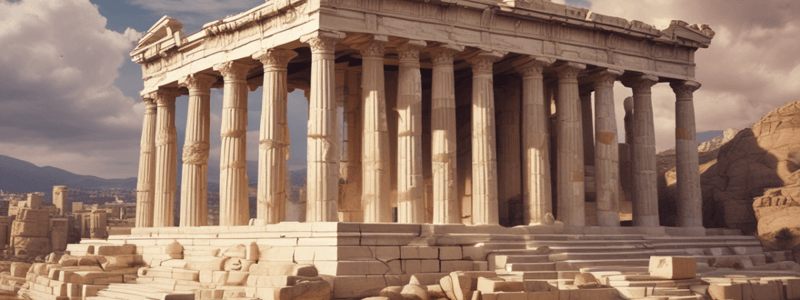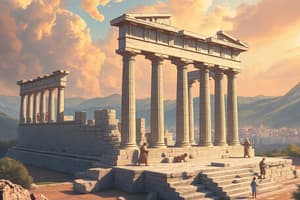Podcast
Questions and Answers
What was the primary role of women in ancient Athens?
What was the primary role of women in ancient Athens?
- To engage in education and cultural activities
- To fight in wars and defend the city
- To participate in politics and governance
- To produce babies and manage households (correct)
How did the Spartans treat their women in comparison to the Athenians?
How did the Spartans treat their women in comparison to the Athenians?
- They treated them equally, with no respect for their rights
- They treated them as goddesses, with absolute power
- They treated them with more respect, giving them more rights and responsibilities (correct)
- They treated them as slaves, with no freedom
What led to the conflict between the Persians and the Greeks in 499 B.C.E.?
What led to the conflict between the Persians and the Greeks in 499 B.C.E.?
- The Greeks were trying to trade with the Persians
- The Greeks were trying to invade Persia
- The Persians were trying to spread their culture to Greece
- The Persians were trying to conquer the Greek city-states (correct)
Which battle did a Spartan force of 300 men hold off an enemy army of 250,000 soldiers?
Which battle did a Spartan force of 300 men hold off an enemy army of 250,000 soldiers?
What was the purpose of the Delian League?
What was the purpose of the Delian League?
Who led the Peloponnesian League?
Who led the Peloponnesian League?
What was the outcome of the Peloponnesian Wars?
What was the outcome of the Peloponnesian Wars?
What was the result of the Peloponnesian Wars for ancient Greece?
What was the result of the Peloponnesian Wars for ancient Greece?
How long did the Peloponnesian Wars last?
How long did the Peloponnesian Wars last?
What happened to the Delian League after the Peloponnesian Wars?
What happened to the Delian League after the Peloponnesian Wars?
Flashcards
Ancient Greek City-States
Ancient Greek City-States
Ancient Greece was not a unified country, but rather a collection of independent city-states, each with its own laws and social structure.
Athens
Athens
Athens was a major Greek city-state known for its intellectual and artistic achievements, valuing education, philosophy, and the arts.
Sparta
Sparta
Sparta was a powerful Greek city-state known for its military prowess and austere lifestyle, prioritizing strength, discipline, and warfare.
Oligarchy
Oligarchy
Signup and view all the flashcards
Direct Democracy
Direct Democracy
Signup and view all the flashcards
Peloponnesian Wars
Peloponnesian Wars
Signup and view all the flashcards
Delian League
Delian League
Signup and view all the flashcards
Trade Network
Trade Network
Signup and view all the flashcards
Spartan Culture
Spartan Culture
Signup and view all the flashcards
Athenian Culture
Athenian Culture
Signup and view all the flashcards
Study Notes
Ancient Greece City-States
- Ancient Greece was not a unified country, but rather composed of different city-states that created their own laws and societal structures.
- Athens and Sparta were the two most powerful and famous city-states in ancient Greece, located on the Greek peninsula.
Athens
- Named after the Greek goddess Athena, Athens was an educated and intellectually inclined society that valued being well-rounded and educated.
- Boys in Athens went to school to learn about art, history, literature, philosophy, public speaking, science, arithmetic, and sports.
- Athens possessed a strong navy, which they utilized for creating a vast trade network with their many allies.
- Athens was the largest of all Greek city-states and is seen as a major cultural influence to the modern world.
Sparta
- Spartan society was essentially the opposite of Athenian culture, valuing strength, size, and fighting ability above all else.
- In ancient Sparta, training, discipline, and fighting skills were the number one priority, often taken to the extreme.
- Spartan women and slaves were treated better than in Athenian society, with more responsibilities and rights.
- Sparta possessed the strongest and largest infantry army in ancient Greece.
Government and Politics
- Athens is seen as the world's first democratic state, where the power rested in the hands of the people.
- The government of Athens was a direct democracy, where citizens directly participated in the process of government and had a voice and a vote in the decision-making process.
- Spartan government, on the other hand, was an oligarchy, where a small group of individuals held the power, with two kings and elected ephors at the head of the government.
Military
- Athenians possessed one of the largest and strongest navies of the ancient world.
- Spartan soldiers were highly feared amongst their enemies, and were thought of as some of the fiercest warriors of the ancient world.
- Spartan men were taught to fight and wield weaponry from an early age, making them highly skilled and feared soldiers.
Economics
- Athenians relied heavily on trade networks, which they cultivated using their navy.
- Spartans were more isolated and avoided trading with other groups, relying heavily on agriculture and the use of slaves.
- Spartans exploited the use of slaves to a much higher degree, treating them poorly.
Life and Culture
- In Athens, boys were encouraged to learn about art, philosophy, public speaking, mathematics, writing, etc.
- Life in Athens was very different from a typical day in Sparta, where strength and fighting abilities were valued above all else.
- Developing soldiers and maintaining their military superiority was the top priority of Spartan culture.
Gender Roles
- In ancient Athens, women were primarily treated as objects, with the sole purpose of producing babies.
- In Sparta, women were given more rights, as well as responsibilities, and were valued more as people.
Wars of Athens and Sparta
- Athens and Sparta fought together during the Persian Wars, but later developed a fierce and bitter rivalry.
- The Peloponnesian Wars were a series of conflicts between Athens and Sparta that lasted for 25 years, ultimately won by Sparta.
- The Delian League was disbanded in 404 B.C.E. after defeat in the Peloponnesian Wars, marking the end of the golden age of ancient Greece.
Studying That Suits You
Use AI to generate personalized quizzes and flashcards to suit your learning preferences.




